Our bank branch closed during the confinement, and so did the office of the Notaire. Our mortgage process ground to a halt, but no one seemed to mind, even though we had a closing date on the contract we’d signed with the seller. Everyone seemed to assume that like an old napping dog, the process would eventually rouse itself and stagger forward. And so it did.
We spoke with our banker every now and then. He was working from home and you could hear his kids shrieking in the background. His English is good, but it had fallen into disuse during the sheltering-in-place days. One day he said, “how it is people can work with children?” To which is said, “Exactment ça, Monsieur.”
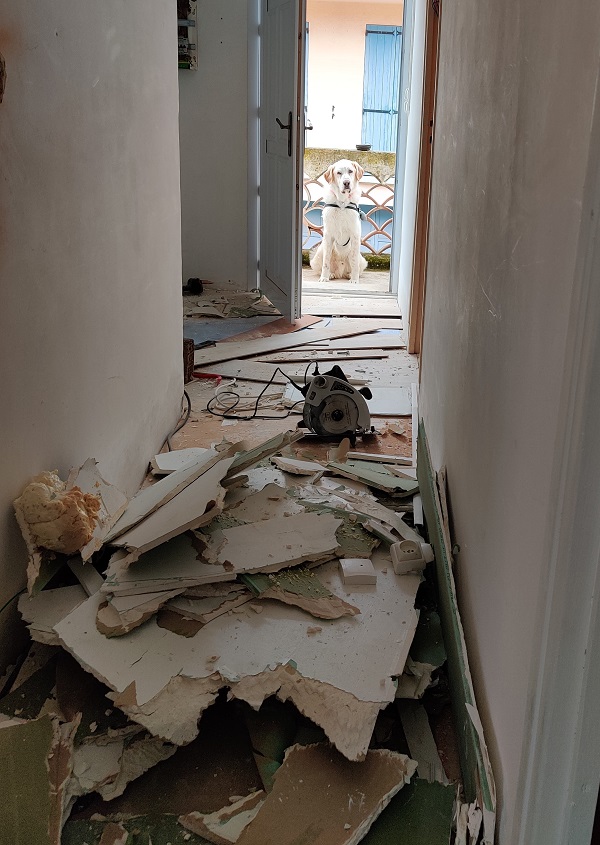
harder than it looks, right Desmond?
Here is what I learned about the French mortgage process: The Addendum is not a popular feature. You sign nine thousand pages of documents, and if there is an error, or a piece of information is added or deleted, you sign all nine thousand pages again. This, of course, creates the opportunity for new errors, even as the old ones are corrected. Also, in order to trigger the creation of an official stack of papers, a pre-official stack must be signed. Often, we were signing a pre-official stack believing we were signing an official stack. We popped several bottles of pricey champagne thinking we’d signed the deal, when in fact we’d only signed a stack that triggered the creation of the next stack.
Finally, in May, we transferred all of our money for the down payment to the Notaire. The next week, the bank funded their portion of the transaction. In the US, ownership changes during one breathtaking, ministroke inducing event. You appear at the title company, sign your docs, bid farewell to your financial freedom, and boom! the house is yours. (Also, a free pen with the Title Company logo.) In France, you sort of ooze into homeownership. Or we did, anyway. The acte de vente — the deed of sale – the final official document that signals the sale is final, was supposed to be mailed to us on the day we transferred our money. A day passed. Two days. A week. Then another.
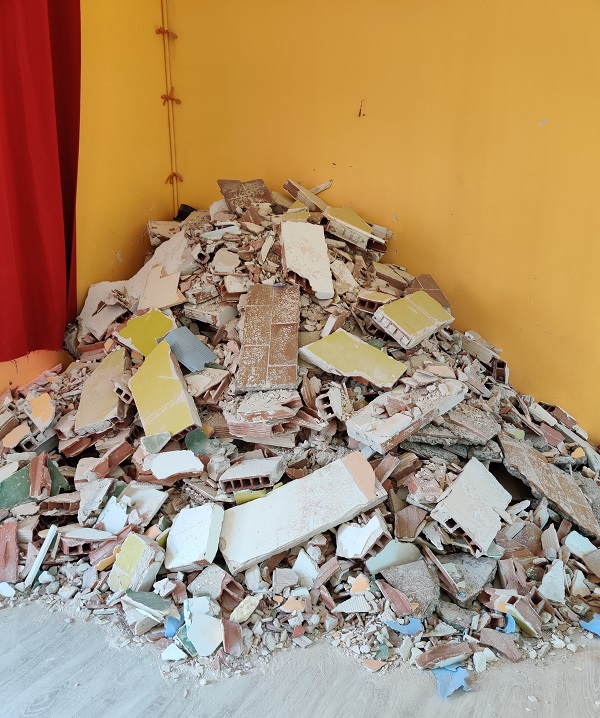
In the meantime, Jerrod started preparing to demolish the walls of the premier étage, the first floor. We were determined to DIY it as much as possible. The bid for doing the demo job was a little high, we felt. Isn’t it fun and easy, bashing down walls with a sledgehammer? Doesn’t it feel good? Therapeutic, even? Indeed, Pascal’s guys should be paying us for the opportunity.
Jerrod chased down good deals on Le Bon Coin (the craigslist of France), and drove all over the region picking up tools: a demolition bar, an angle grinder, various hammers and saws, and a squat, blue and gray shop vac he bought from an old German in Leucate. He strapped the vac on the back of his motorcycle. He will deny this, but he confessed to pretending he was riding through France with R2-D2.
He began to tinker. He removed some shelving. Then a little molding. He took the towel rack off the wall in the bathroom. He applied himself to all the minor “demolishments” that could be restored if the deal went south. As the days passed and the acte de vente failed to appear, I began to think something had gone wrong, while Jerrod came to believe that it was merely another piece of paper stuck somewhere in the system. He decided he agreed with the French, that the meaning of the paperwork was less important than the fact of the paperwork, moving from hand to hand, gaining signatures and official stamps along the way. Thus convinced, one morning he decided to have at the bathroom wall with his sledgehammer.
Twenty minutes later, he gave up. It turns out our house is not just ugly, but sturdy. Without knowing it, we had purchased the third little pig’s house, the one made of brick. We understood why it cost more than expected to take out the walls. It was practically impossible. Jerrod put away his tools. We went for a swim, then split a bottle of wine. All problems solved.
Two days later the acte de vente arrived in the mail. The day after that, Pascal arrived with his French-Spanish subcontractor, Antoine, and his crew. Ours was their first job after the confinement. For more than two months they’d sat around, waiting. They lost income. They were antsy and bored. Now, they seemed overjoyed to have something to do. They worked fast. In a single day they demoed the entire premier étage, leaving perfect ten-foot piles of pieces of brick wall, pieces of which were still affixed to the Sheetrock. They were beautiful, those giant piles. They looked like art installations. I tried to take pictures of everything, every step of the way. Antoine wouldn’t let me take his picture, but his young partner was happy to pose by one of the art installation-piles. He said “For Facebook? In process!”
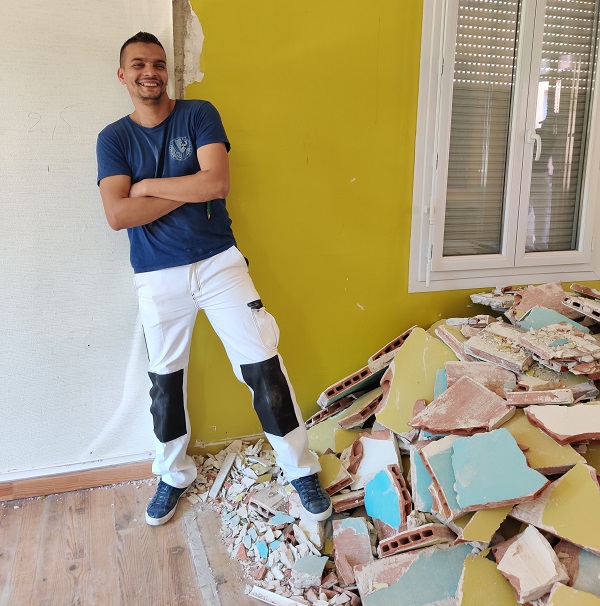
That afternoon, I left the Ugly House and returned to our apartment in the centre ville. We wouldn’t be able to move into the ground floor of our new house until we’d purchased a bed – another saga for another time. I crossed the rue de la Démocratie, the wide street that runs between the shops and the beach. Desmond trotted ahead of me on his leash. I was wearing a pair of cute shoes that were a half size too big. (Note to self: you wear a true 40, and not a 41, in European sizes). I thought: we are the proud owners of a little bit of France. I skipped with joy! Then tripped and fell, banging both knees, wrenching my left big toe, scraping my thigh on the curb. A girl in a green car, with two yellow dogs sharing the passenger seat, saw me fall and jumped out, leaving her car in the middle of the street.
“Madame, Madame! Ça va?!”
“Super bien!” I said. Super bien.
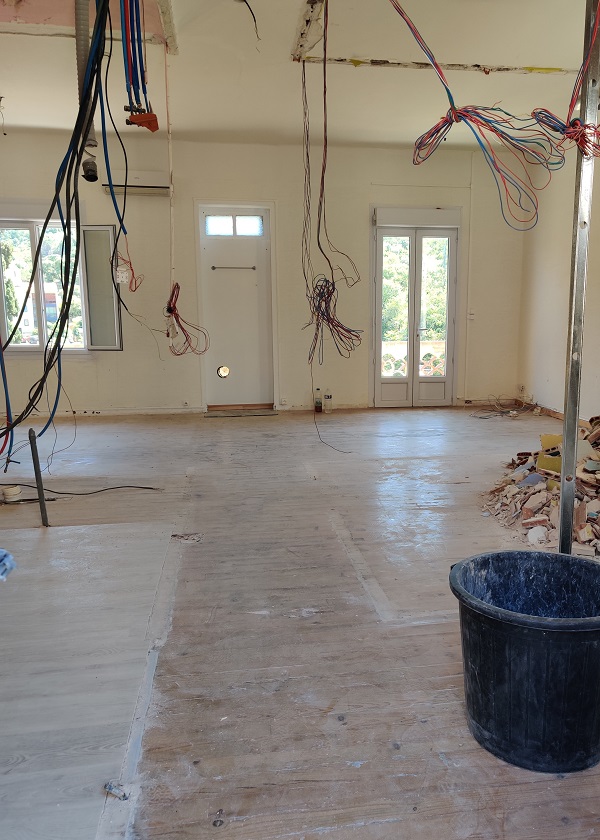


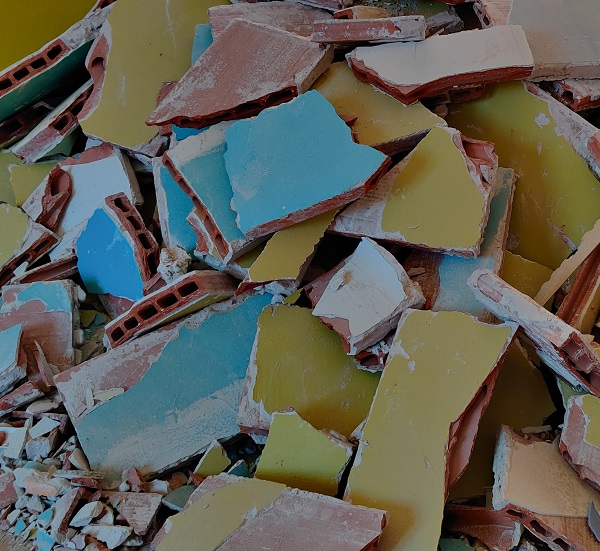






J’adore cet histoire. Je voudrais le lire tout d’un coup, mais vous nous torturez avec ces petits morceaux délicieux. Merci en tout cas. Bisous.
Merci, cherie. Vous connaissez l’expression: “peu a peu l’oiseau fait son nid?” C’est le meme avec le refaire la maison et le blogging. Aussi, j’apprecie votre francais. Brava! Bisous a vous.
Really enjoying this.
Thank you, Jack. I hope life in the mountains is treating you well. x
Fantastic read…it felt as if I was there! Brick walls…too funny…..and the big, open room is amazing!
Best, t Marta
Thank you. Yeah, the bricks were a surprise!
What is the circle in the front door for?
I’m tempted to say it’s some crazy Catalan cultural thing, but actually this is a back door that’s been sealed (why? who knows) and the hole had to do with the jerry-rigged nature of the air-conditioner, half of which was inside, half of which was out. Don’t ask. 🙂